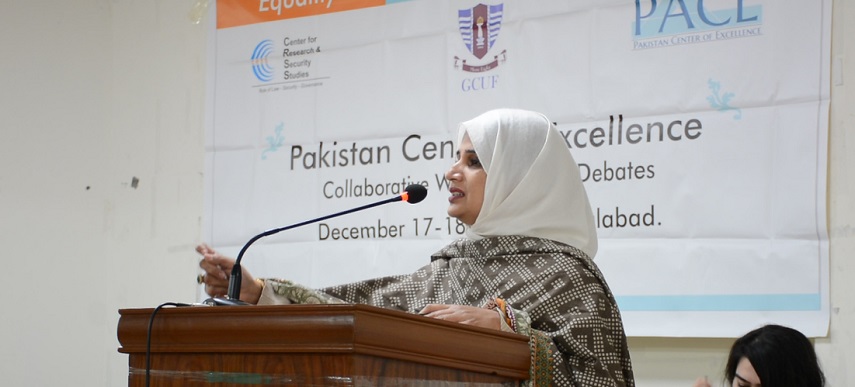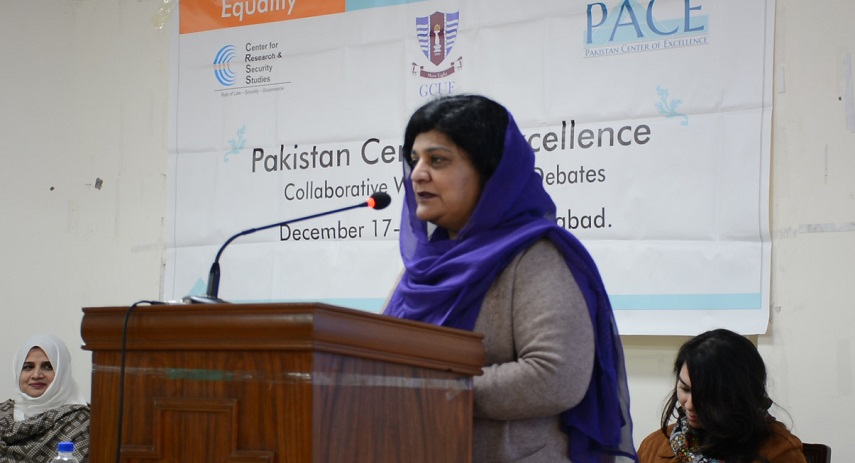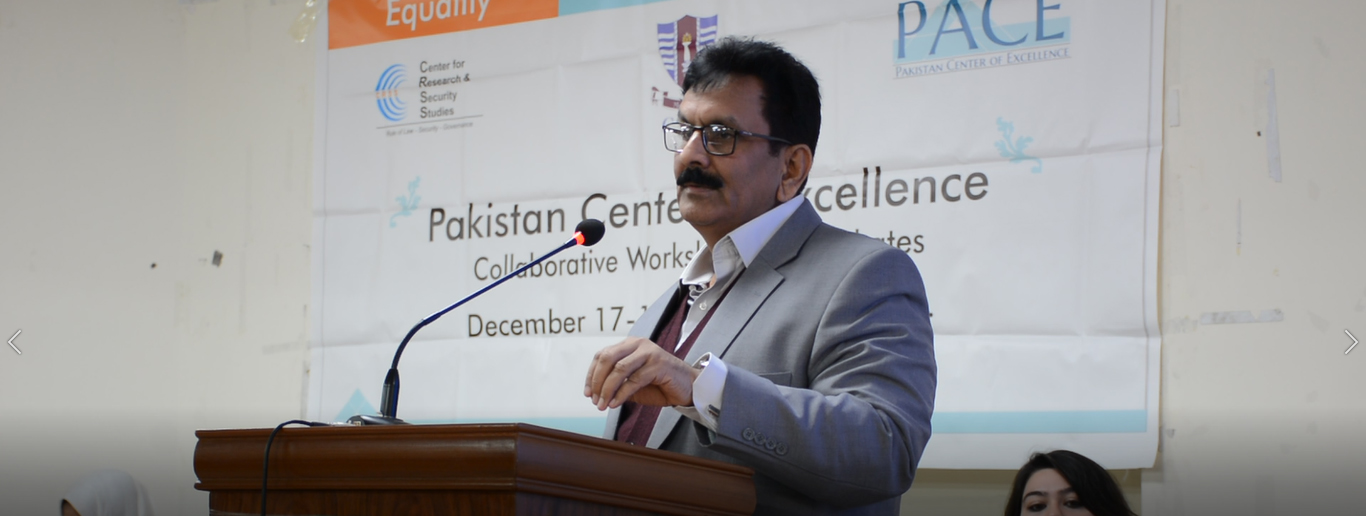The Center for Research and Security Studies (CRSS) conducted the eleventh two-day PACE Collaborative workshops and debates for university students, on December 17-18, 2020, in Faisalabad. The workshop was held at Government College University, Faisalabad, and was organized under the umbrella of the Pakistan Center of Excellence (PACE), a counter-radicalization and pluralistic values’ focused project, in collaboration with the Dutch Government.
Participants included students from Government College University, Faisalabad. Dr. Asma Aftab Assistant Professor Department of English welcomed the participants to the event. She shared that it is an immense pleasure for the university and students to have CRSS team over for the seminar. She mentioned about her experience as one of the participants of phase I of PACE Collaborative Workshops. She said that his experience with PACE has always been good in terms of knowledge sharing and capacity building. She added that PACE helped her understand and respect the perspectives and avoid to indulge in any discriminatory behaviour. This opportunity will surely impact our students in a positive way and I hope to see a change in understanding of differences.
Head of the Department opened the session with thanking PACE team for organizing the seminar at their department and he is pleased to see the program of the seminar including the names of learned scholars. He said that rule of law is a prerequisite for a democracy and without its implementation, we can look forward to have equality in a society. I hope the speakers will talk in detail and I hope the students will benefit from this opportunity to a maximum.
Farhana Kanwal, Project Manager PACE, said that it is a very different experience coming to Faisalabad and getting to know the students and interacting with them. She shared that PACE is a counter radicalization initiative by CRSS which was started in September, 2015 and completed its first phase in September, 2018. The core objective of PACE is to indoctrinate the tradition of questioning and critical thinking among the youth of Pakistan. She added that the purpose of such activities is to bring together the youth at one platform and discuss about critical issues of multiculturalism, diversity, democracy and accountability.
Ms. Shagufta Khalique spoke on ‘Conflict Resolution and Peace Building Approaches’. She elaborated on the context, behaviour and attitude model of conflict with students. Tolerance and patience are the two main components which can lead us to a peaceful society. She further elaborated that peace has two aspects; internal and external. If a person is internally peaceful, his mind and heart don’t support conflicting and violent behaviour that person will automatically be a messenger of peace. However, on the other hand, person with believe in violence and aggression will damage the society by only wanting himself to be accepted and respected. Internal satisfaction makes a difference and impacts the environment. Peacebuilding is a mechanism and it starts where the war or conflict has ended and then where there is already an ideal situation but you try to refine the situation. Conflict resolution and peacebuilding go hand in hand. Conflict is basically a disagreement or difference of opinion in simplest its simplest form which can be based on resources, emotions and so many other things. Conflict is natural and it exists since forever; however, we need to minimize the negative impacts of the conflict by resolving and understanding its nature it through peaceful means.
The second session of the day was started by Mr. Hamza Naseem on ‘Diversity in Pakistan’. He conducted an activity and concluded it saying that diversity is all about differences. It is all about being unique and different from the other and it is beautiful to be different. Each individual is different in many ways from the others and differences of personalities and ideas should be accepted and respected. We need to develop the habit of listening to others and understand their perspectives. Speaking of Pakistan, there is so much diversity is here in terms of religion, culture, language, gender and ethnicities. We have to understand that the society we are living in is diverse and it’s a permanent factor. There are certain stereotypes regarding various ethnicities or religions which need to be challenged and changed. No trait is a permanent part of any religion, culture or ethnicity, being different is natural.
The third session of the days was conducted by Dr. Jamil Ahmed who spoke on ‘Democracy and Good Governance’. He shared that we are living in a world that believes in democracy and accountability. We have to compete to get to a status or position in today’s world; it’s not inherent anymore. In true democracies, system is transparent and citizen engaged is encouraged and appreciated. He noted that for a true democratic system, all the institutions need to maintain their constitutional limits and separation of powers should be ensured by not interfering into one another’s domains. In this regard, the legislature, executive and judiciary should only commit to legislation, execution and adjudication respectively.
Mr. Safiullah Gul is an acclaimed journalist and his session was based on ‘Media Ethics.’ He gave an insight on reporting and journalism and how crucial it is to report facts and the credibility of the information are the foundations of good journalism. He criticised immature journalism and how it spreads chaos rather than information. He explained how a story should be neutral explaining both sides. Sensationalism should be avoided and self-censorship should be considered. Biased and abusive attitude should not be accepted. He stressed on the importance of being neutral and presenting authentic news.
Ms. Farhana Kanwal closed the session with highlighting the importance of debates and critical thinking. She said that debate is a way of identifying and discussing the issues with logic and reason. She further said that an ideal society would always look beyond differences and there will be respect of rights and opinions for all, with no discrimination. Ms. Kanwal also thanked the participating universities and students for their support and encouragement throughout the seminar.




